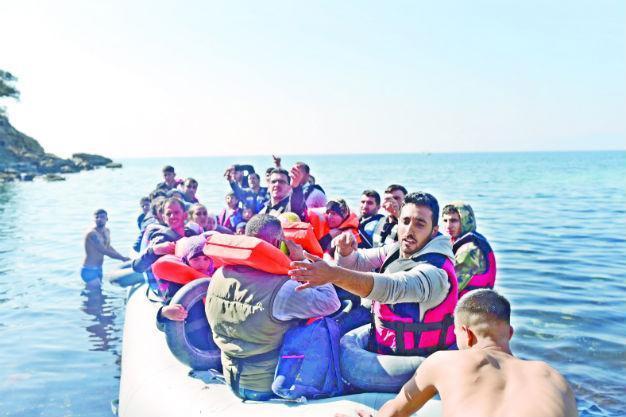Turkey stops 24,120 irregular migrants in 45 days
ANKARA

AFP photo
Turkish authorities prevented more than 500 refugee a day from traveling to Europe in the first two months of 2016, officials have said ahead of a summit between Turkey and the European Union during which the flow of refugees to the continent will be discussed.“During January and until Feb. 15, [in total], 24,120 irregular migrants were prevented from departing from our country and 93 migrant smugglers were captured by our law enforcement forces. Just on Feb. 15, the Turkish Coast Guard Command stopped 985 irregular migrants,” Foreign Ministry Spokesperson Tanju Bilgiç said March 2.
The same day in Brussels, however, officials from the 28-nation bloc told the Reuters news agency that Germany, the principal destination for migrants, was looking for daily flows to drop below 1,000 a day before it would consider taking any refugees directly from Turkey for resettlement.
Three months after Ankara agreed to help tackle Europe’s worst migration crisis since World War II, more than 2,000 people a day are still crossing the Aegean Sea in dinghies and fishing trawlers from Turkey to the Greek islands.
At a press conference in Ankara on March 1 after two days of talks with Turkish officials, Frontex Executive Director Fabrice Leggeri told reporters that the number of migrants crossing into Europe in January and February this year was 30 times higher than the figures year-on-year.
EU officials told the Hürriyet Daily News that the number of irregular migration cases from Turkey to Greece was just 1,700 in January 2015, rising to an astounding 68,000 in January 2016.
Bilgiç also announced that Turkey had offered to sign readmission agreements with 14 countries in a move aimed at enabling Turkey to take back migrants rejected by the European Union more quickly.
“Turkey has been taking all measures to block irregular migration. Naturally, the immediate cut of irregular migration is out of the question; we don’t have a silver bullet,” Bilgiç said. “In the first two months of 2016, there was a considerable decrease in the number of migrants who transited to the Greek islands from Turkey.”
The EU is relying on Turkey to help stem the flow of Syrians fleeing civil war, giving Ankara 3 billion euros ($3.3 billion) to set up centers and resettle refugees, although progress in implementing the deal has been slow.
The spokesperson urged the EU to fulfill the “promises it made to Syrians” in this deal, in particular the allocation of the 3 billion euros.
Pressure to enforce the plan is growing as EU officials say thousands of migrants are still crossing the Aegean daily from Turkey after more than 1 million made the perilous journey last year, the greatest such movement in the bloc’s history.
Before the March 7 summit of the EU and Turkey, EU Council President Donald Tusk is expected to arrive in Ankara on March 3 for talks with Davutoğlu. Tusk is expected to proceed to Istanbul for talks with President Recep Tayyip Erdoğan on March 4.
In Brussels, the European Commission confirmed on March 2 that Greece was in the process of returning 308 irregular migrants to Turkey. Despite confirming that there was such a process occurring, Bilgiç declined to mention figures.
“The commission has been working with the Greek and Turkish authorities to improve the implementation of the bilateral readmission agreement between Greece and Turkey and to facilitate the returns of irregular migrants. Yesterday and today [Feb. 29 and March 1], the return of 308 irregular migrants, mainly of Moroccan, Algerian and Tunisian origin, is taking place from Greece to Turkey. This sends a clear signal that those who do not qualify for international protection will be returned,” Commissioner for Migration, Home Affairs and Citizenship Dimitris Avramopoulos said.
In Ankara, Bilgiç confirmed that the return was taking place within the framework of a bilateral readmission agreement signed between Ankara and Athens in 2001.
“This is a living process. It is part of the steps that Turkey has been taking,” he said.
















